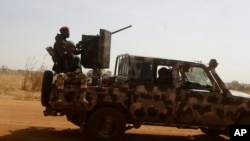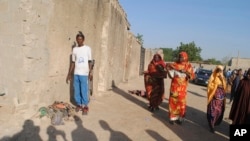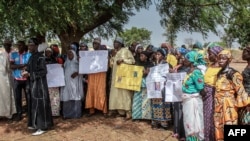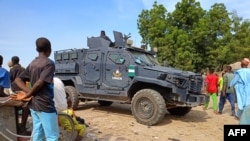On March 30, Bayo Onanuga, a journalist who now works as the Nigerian president's special adviser on information and strategy, was interviewed by the “Mic on Podcast” about the burning issue of security in Nigeria.
When the podcast’s host, Seun Okinbaloye, asked Onanuga if he would describe Nigeria as one of the safest places to live in, as he had suggested in a different forum, Onanuga replied: “Nigeria is safe… It’s one of the safest countries in the world.”
Okinbaloye then asked Onanuga: “Compared to South Africa and United States you believe is that Nigeria is safer?”
Onanuga responded: “Relatively safer, because I am in Abuja now, I’m safe. I go to my town, I’m safe. I go to Lagos, I’m safe.”
That is false.
Nigeria is plagued by kidnappings, terrorist attacks, banditry and multiple other crimes.
The Global Terrorism Index, a report published annually by the Institute for Economics and Peace (IEP), a global think tank headquartered in Sydney, Australia, ranks Nigeria eighth among the ten countries most impacted by terrorism.
In its most recent annual ranking, the Global Organized Crime Index, produced by the Global Initiative Against Transnational Organized Crime (GI-TOC), a Geneva-based international non-governmental organization, assessed Nigeria as having the world’s sixth “highest criminality rate,” far worse than the U.S., which it ranked 67th.
According to NationMaster, a database that offers a directory of variables for comparison purposes, crime levels in Nigeria are 47 percent higher than in the United States, and people in Nigeria are three times more likely to be murdered than people in the U.S.
Kidnappings for ransom, or to pressure the government to meet the kidnappers’ demands, frequently occur in Nigeria, with schoolchildren frequently targeted.
On March 8, gunmen on motorcycles in Kaduna state, near Nigeria's capital city, Abuja, abducted 287 children from their school.
In January, armed men invaded a home in Abuja and abducted five sisters, one of whom was murdered when the deadline for paying a ransom passed.
April 14 will mark a decade since the abduction of 276 female students at a government secondary school in Chibok, a town in Nigeria’s Borno State, prompted international outrage.
Multiple terrorist groups operate in Nigeria, the deadliest being the Islamist group Boko Haram.
In November 2013, the U.S. State Department designated Boko Haram, which had been terrorizing the country since 2009, as a “foreign terrorist organization and specially designated global terrorist organization.”
On March 21, SBM Intelligence, an African intelligence-gathering firm, reported that “at least 735 mass abductions, involving over 15,398 victims” had been recorded in Nigeria since 2019, adding: “2024 alone has seen at least 68 mass abductions, averaging over one per day.”
Last September, the U.S. State Department issued a travel advisory warning American citizens about traveling to Nigeria.
The advisory, which put Nigeria in the category of “Level 3: Reconsider Travel” (one level below the highest warning category, “Level 4: Do not travel”), stated:
“Reconsider travel to Nigeria due to crime, terrorism, civil unrest, kidnapping, and armed gangs. Some areas have increased risk.”
New York-based Human Rights Watch wrote the following about Nigeria in its most recent annual report: “Multiple armed groups continue to kill and jeopardize the livelihood of millions across the country.”
It reported that in northwestern Nigeria, gangs of so-called bandits are responsible for killings, kidnappings, sexual violence and looting, while in the northeast, there has been a resurgence of attacks by the Islamic State West Africa Province (ISWAP), a breakaway faction of Boko Haram.
In Nigeria’s Middle Belt and Northcentral region, “[d]ecades long intercommunal conflict between farmers and herders … continue to claim lives, while the authorities struggle to contain the clashes around land and other resources, which are exacerbated by ethnic and religious tensions," Human Rights Watch wrote.
It added:
“Security forces continue to be implicated in gross human rights abuses, including indiscriminate airstrikes, while the authorities have repeatedly failed to hold officers responsible for the abuses accountable through the justice system.”
In February 2023, the U.N.’s Special Adviser on the Prevention of Genocide voiced concern over the worsening security situation in Nigeria, while urging the authorities to ensure counter-terrorism operations observe international human rights and humanitarian law.
In 2016, the U.N. reported that “Nigeria accounted for over 350 million or 70 percent of an estimated 500 million illicit weapons” circulating in West Africa.









